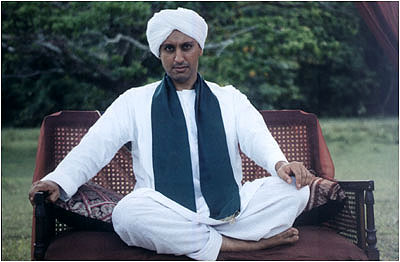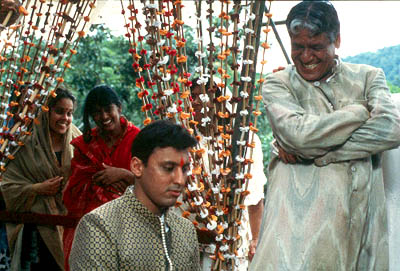

All that Ganesh wants to do is right books. He reads voraciously, and dutifully sits at his desk every day writing. The Mystic Masseur is the first of V.S. Naipaul's novels adapted to the big screen. Naipaul won the Nobel Prize for literature in 1991, so there is a heightened sense of curiosity and buzz about this movie. The end product is nothing extraordinary, but it is a nice, whimsical look at meteoric rise of its title character. This is also a Merchant-Ivory film, which, stereotypically means pretty costumes, pretty scenery, and lots of dialogue. Well, the subject of The Mystic Masseur is about Indians in Trinidad, so automatically, many of the normal ideas about films, Merchant-Ivory and otherwise, go out the window. Partap (Jimi Mistry, Born Romantic, East is East), a longtime friend and associate of Ganesh, narrates the story.
Local Indians idolize Ganesh (Aasif Mandvi, American Chai, Random Hearts) because he reads so much. He knows big words, and speaks like an educated man. Ramlogan (Om Puri, East is East, Happy Now) likes him so much he offers his daughter Leela (Ayesha Dharker, The Terrorist, Star Wars: Episode II - Attack of the Clones) to Ganesh in marriage. Ganesh accepts, and the two begin a happy marriage, albeit with some setbacks. Ganesh's father was a masseur, and Leela and Ramlogan want him to continue in his father's footsteps, but Ganesh's mind is set on finishing his book. Eventually, he realizes that in order to write and buy books, he needs money, and the best way to get money is to be a masseur. He rechristens himself as the "mystic masseur," adopting a traditional style of clothing and a mysterious attitude.
As the mystic masseur, Ganesh uses his vast knowledge and a little bit of showmanship to heal his patients, becoming vastly popular in the process. This means he has more patients that give him more money, and this lets him print and write more books. Inevitably, politics come calling and he decides to take the next step in his growing renown. Here is where Caryl Phillips' (The Final Passage, Flying Away) adaptation begins to falter. The tone begins to change to a more serious one, and much of the spirit of fun present in the first part goes missing. Part of what makes The Mystic Masseur enjoyable is the zeal that Ganesh has for learning. All he wants to do is read and write. At one point, it causes Leela to leave him temporarily. After his life as a politician begins, director Ismail Merchant (Cotton Mary, The Proprietor) changes to focus from whimsy to one of disillusionment. The tone of the movie changes, as Ganesh must begin strategizing on ways to gain power, rather than how he can help people.
The Mystic Masseur takes place a little after India left the British Empire, and ideas of independence were beginning to ferment in the minds of Indians in Trinidad. It's an interesting perspective in general because the number of non-Bollywood Indian movies that make it to domestic shores is small, the number of movies about Trinidad is smaller, and the confluence of the two is a true rarity. Naipaul is an Indian native of Trinidad, so he knows much of the material well. Merchant is a master at visuals, and he makes the island come to life. All of the actors gamely tackle the Caribbean accent, and the three principals are all good in their roles. Puri (a legend in Indian cinema) in particular. Ramlogan is nothing more than an opportunist with a heart. Greed motivates everything he does, and everybody can see right through this facade, but he is so smooth and good at what he does that it's easy to forgive him. He wants Ganesh to succeed so that by association, he can become rich and famous. Ganesh and Leela are both smart and can think quickly on their feet, and this is one of the main reasons for their success. One of the best scenes in The Mystic Masseur is Ganesh's first healing, where he cures a young Partap of visions. It is a microcosm of the entire movie, melding together the exotic local, light humor, and cleverness of the main characters.